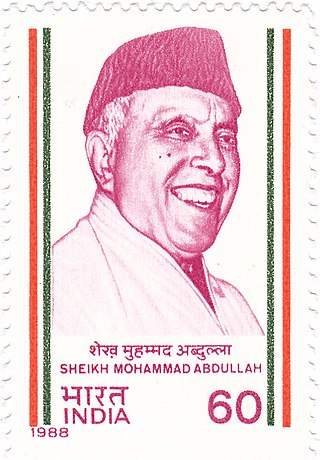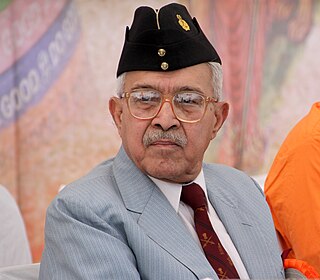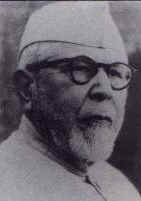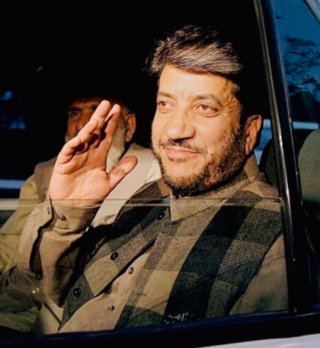Mehmooda Ali Shah | |
|---|---|
| Born | 1920 Srinagar, Jammu and Kashmir, India |
| Died | 11 March 2014 Srinagar, Jammu and Kashmir, India |
| Resting place | Malteng graveyard, Sri Nagar, Jammu and Kashmir |
| Occupation(s) | Educationist Social activist Politician |
| Known for | Women's education |
| Parent(s) | Syed Ahmed Ali Shah Dulhan Begum |
| Awards | Padma Shri Most Outstanding Student of the Century |
Mehmooda Ahmed Ali Shah (1920-2014), also known as Miss Mehmooda, was an Indian educationist, social activist and the principal of Government College for Women, M.A. Road Srinagar. [1] She was a close friend of Indira Gandhi and is reported to have worked for creating awareness among the women of Kashmir about the importance of education and for their social empowerment. [2] The Government of India awarded her the fourth highest civilian honour of the Padma Shri, in 2006, for her contributions to Indian education. [3]
Mehmooda Ali Shah was born in 1920 to Dulhan Begum and Syed Ahmed Ali Shah, a Forest Range Officer, in Srinagar in the princely state of Kashmir in the British India and did her schooling at the local Missionary Girls' School (present day Mallinson Girls School) from where was the first girl to pass the 10th standard examination. [4] She was the only girl child of the Ali Shah couple, her three brothers would later become high ranking officials; Naseer Ahmed, a medical academic and a medical college principal, Syed Ahmad Shah, a Deputy Inspector General of Police and the third, Zameer Ahmad, a sessions judge. [5] Moving to Lahore for her higher studies, she graduated in Arts (BA) from the Punjab University, Lahore and continued there to secure a graduate degree in Education (BEd) and a post graduate degree (MA) in Political Science. She is known to be the first woman post graduate of the Punjab University, Lahore. [4] She also gained a postgraduate diploma in Leeds, UK. [4]
Reportedly on advice from Muhammad Iqbal, the poet and political thinker, Mehmooda returned to Sri Nagar and joined a local school in Maisuma as a teacher. [4] Later, when a new school was opened at Baramulla by the then Maharajah, she was appointed as the Headmistress. She worked there for a number of years till her appointment as the principal of the Government College for Women, M.A. Road Srinagar in 1954. [4] During her tenure as the Headmistress and, later, as the principal, she is known to have worked to persuade the local women to pursue education [2] and for the establishment of a second women's college in Srinagar. Her efforts are also reported in promoting arts and sports activities in the college. [6] In 1975, she resigned from the college and, reportedly influenced by her association with Indira Gandhi, moved to Delhi to get involved with the activities of the Indian National Congress. She served the party as a Secretary of the All India Congress Committee (AICC), but returned to Srinagar after the death of Indira Gandhi in 1984, though she remained a member of the AICC. [4] She also served as a member of the Jammu and Kashmir Legislative Assembly from 1987 to 1990. [7]
The Government of India awarded her the civilian honour of the Padma Shri in 2006. [3] In 2012, her alma mater, Mallinson Girls School, honoured her as the "Most Outstanding Student of the Century". [6] Mehmooda, a spinster throughout her life by choice, died on 11 March 2014, at the age of 94, at her residence in Srinagar. She was buried at the local graveyard in Malteng. [5]

Syed Ahmed Shah Bokhari, commonly known as Patras Bokhari, was a Pakistani humorist, writer, broadcaster and diplomat who served as a Permanent Representative of Pakistan to the United Nations.

Sheikh Mohammad Abdullah was an Indian politician who played a central role in the politics of Jammu and Kashmir. Abdullah was the founding leader of the All Jammu and Kashmir Muslim Conference and the 1st elected Prime Minister of Jammu and Kashmir after its accession to India. He agitated against the rule of the Maharaja Hari Singh and urged self-rule for Kashmir. He is also known as Sher-e-Kashmir.

Lieutenant General Mohammad Ahmed Zaki is a former general officer of the Indian Army.

Burn Hall School is an all boys missionary school in Srinagar, Jammu and Kashmir, India. Its motto is "Industria Floremus - In Toil We Flourish" . It is one of the oldest schools in the valley. The school celebrated its Diamond Jubilee in 2016.

Tyndale Biscoe School is a school in the Sheikh Bagh neighbourhood, in the Lal Chowk area of Srinagar, Jammu and Kashmir, India. The school was founded in 1880 CE and is one of the oldest schools in Jammu and Kashmir, the oldest being S.P school which was founded in 1874 CE. The school was started by Christian missionaries and was named after Canon Cecil Tyndale-Biscoe (1863–1949). It still has affiliations with the Church Mission Society. The first principal was Reverend J.H.Knowles.
Asiya Andrabi is a Kashmiri separatist and founding leader of Dukhtaran-e-Millat. This group is part of the separatist organisation All Parties Hurriyat Conference in the Kashmir valley. Government of India has declared it as a "banned organization". The organisation claims that it aims for the freedom of Kashmir from India.
Vidyaben Shah was an Indian social worker and activist known for her work with children, women and the elderly in India. While she was already serving as Vice-President, she was appointed the first non-officio President of the New Delhi Municipal Council (NDMC) by Prime Minister Indira Gandhi in 1975. She has held several leading positions in the field of social welfare since the 1940s. Vidyaben Shah died at the age of 97 on 19 June 2020 at her residence in Delhi, her son Mihir Shah confirmed the news of Vidyaben Shah death.

Abdul Majeed Khwaja was an Indian lawyer, educationist, social reformer and freedom fighter from Aligarh. In 1920, he along with others founded Jamia Millia Islamia and later served its vice chancellor and chancellor.

Shabir Ahmad Shah popularly known as Shabir Shah, in Kadipora, Anantnag, Kashmir is the founder and president of the Jammu and Kashmir Democratic Freedom Party (JKDFP), one of the main separatist political organizations seeking "right of self-determination" to Jammu and Kashmir.

Mallinson Girls School is located in the heart of Srinagar, in the Kashmir Valley of Jammu and Kashmir, India. The school was founded by Ms Fitze Mallinson in 1912 at Fateh Kadal and later shifted to Sheikh Bagh in the Lal Chowk area of Srinagar.

S. P. Varma is a social worker and peace activist from Jammu and Kashmir. He has been actively involved in peace-building efforts in conflict-ridden areas of the Kashmir valley.
Asha Devi Aryanayakam (1901–1972) was an Indian freedom fighter, educationist and gandhian. She was closely connected with Sevagram of Mahatma Gandhi and the Bhoodan movement of Vinoba Bhave.
Som Nath Sadhu (1935–1982) was an Indian theatre personality known for his contributions to Kashmiri theatre as an actor, playwright and director.

Sheikh Abdullah, also known as Papa Mian, was an Indian educationalist, social reformer, lawyer, founder of Women's College, Aligarh and a member of the Executive Council of the Aligarh Muslim University who served to the post from 1920 to 1928. Later in 1902, he was appointed to the All India Muhammadan Educational Conference as a secretary for women's section. He is primarily known for his contribution to the Muslim women education during British India period.
Begum Zaffar Ali, née Sahibzaadi Syeda Fatima, was an Indian women's rights activist and the first woman matriculate of the Indian state of Kashmir and Jammu who went on to become Inspector of Schools in Kashmir. She was an educationist, women's liberation activist, deputy director of education and later a legislator in the Indian state of Jammu and Kashmir. She was associated with the activities of the All India Women's Conference and was its secretary before partition, but a chance meeting with Muhammad Ali Jinnah and his sister, Fatima Jinnah in Kashmir, who would later visit the family for banquets, influenced her and she left the conference to concentrate her efforts in women's liberation movements in the pre-independent India.
Rajmohini Devi was an Indian social worker, gandhian and the founder of Bapu Dharma Sabha Adivasi Seva Mandal, established by her in 1951. The famine of Surguja in 1951 involved a great scarcity of food grains and crop failure. The famine had direct bearing on the rise of a reform movement called Rajmohini Devi Movement, a non governmental organization working for the welfare of the tribal people of Gondwana, in the Indian state of Chhattisgarh. It was reported that she had a vision about Mahatma Gandhi and his ideals during the famine of 1951, and she started a movement, for the liberation of women. and eradication of superstitions and drinking habits among the tribal people. The movement gradually assumed the status of a cult movement with a following of over 80,000 people and was later converted into a non governmental organization, under the name, Bapu Dharma Sabha Adivasi Seva Mandal. The organization functions through several ashrams set up in the states of Chhattisgarh, Bihar and Uttar Pradesh.
Nuruddin Ahmed was an Indian lawyer and three-time mayor of Delhi. Born in 1904 in Delhi in a wealthy family to Principal Mushtaq Ahmed Zahidie, of Sadiq Eggerton College, Bhawalpur, India. He did his early education at St. Xavier's School, Delhi and completed his pre-graduate studies from St. Stephen's College. Subsequently, he did Classical Tripos from Cambridge University before studying law at the Inner Temple from where he was called to the bar. Returning to India, he started his career as a junior to Muhammad Shafi where Fakhruddin Ali Ahmed, who would later become the fifth president of India, was his colleague, and started practice at Lahore High Court. Then, he went to Delhi to continue his practice and became known for his prowess in criminal trials. He was also involved in civic administration and during his four terms as a member of the Delhi Corporation, he served as the mayor of Delhi for three terms, from 1960 to 1965. The Government of India awarded him the third highest civilian honour of the Padma Bhushan, in 1964, for his contributions to public affairs. Ameena Ahmad Ahuja, a noted artist, was his daughter. Ahmed died in 1975, at the age of 71.

Mehvish Mushtaq Hakak is an Application and Software developer, who created a Business Directory App for Kashmir called "Dial Kashmir", in 2013, for the Kashmir valley, which made her the first Kashmiri female to develop an Android app.
The Tyabji family, also known as Tyabji-Hydari,Tyabji-Fyzee, and Tyabji-Futehally family, consists of Mullah Tyab Ali and his descendants. The Tyabji family has gained prestige for its involvement in India's independence movement with individuals being prominent politicians, diplomats, academics, scientists, activists, and athletes. Other members gained prominence for their roles in India's Navy and Air Force and contribution to Indian film and fine art. Individuals within the Tyabji family belong to the Indian royal families of the Nizam of Hyderabad, the Nawab of Bengal, Raja of Wanaparthy, and the Nawab of Janjira.